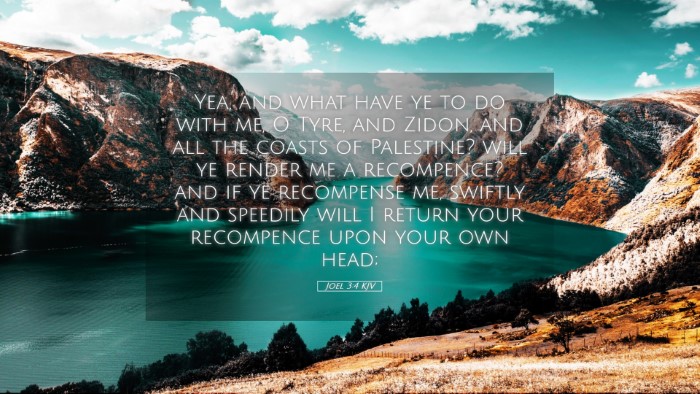Old Testament
Genesis Exodus Leviticus Numbers Deuteronomy Joshua Judges Ruth 1 Samuel 2 Samuel 1 Kings 2 Kings 1 Chronicles 2 Chronicles Ezra Nehemiah Esther Job Psalms Proverbs Ecclesiastes Song of Solomon Isaiah Jeremiah Lamentations Ezekiel Daniel Hosea Joel Amos Obadiah Jonah Micah Nahum Habakkuk Zephaniah Haggai Zechariah MalachiJoel 3:4
Joel 3:4 KJV
Yea, and what have ye to do with me, O Tyre, and Zidon, and all the coasts of Palestine? will ye render me a recompence? and if ye recompense me, swiftly and speedily will I return your recompence upon your own head;
Joel 3:4 Bible Commentary
Commentary on Joel 3:4
Verse Text: "Yea, and what have ye to do with me, O Tyre, and Zidon, and all the coasts of Palestine? Will ye render me a recompense? And if ye recompense me, swiftly and speedily will I return your recompense upon your own head."
Contextual Overview
The book of Joel, attributed to the prophet Joel, encapsulates profound themes of judgment and restoration. It is significant to interpret this verse within the context of God's overarching plan for Israel and the nations surrounding them. In this chapter, Joel prophesies the impending judgment against the nations that have wronged Israel.
Exegesis of Key Phrases
“What have ye to do with me”: This rhetorical question indicates a separation between God and the nations, highlighting their past grievances against Him and His people. Tyre and Zidon, known for their commercial and maritime prowess, symbolize the pride of the Gentile nations.
“Render me a recompense”: This phrase underscores the idea of justice and payback. God is addressing the nations that have plundered Israel, calling on them to consider their actions and the inevitable consequences that will follow.
Insights from Public Domain Commentaries
Matthew Henry's Commentary
Matthew Henry expounds on the text by emphasizing that God's concern is not merely for Israel, but also for the retribution that He dispenses to all who act wickedly. He juxtaposes the arrogance of Tyre and Zidon with God's authoritative response. Henry asserts that these nations had not only harmed Israel but acted against God Himself, provoking His wrath.
Henry elaborates on the severity of God's judgment, indicating that their actions would lead to swift consequences. He notes that God will not allow injustice to persist indefinitely, and when these nations are brought to account, their supposed might will not shield them from divine retribution.
Albert Barnes' Notes
Albert Barnes provides a linguistic and historical perspective on the verse. He points out that Tyre and Sidon were wealthy and powerful, yet they were spiritually impoverished. Barnes suggests that their enrichment at the expense of others led to a moral decay that God could not overlook. Such nations were warned of their impending doom due to their oppression of God's people.
He further interprets “recompense” as a term that carries the weight of justice. Barnes emphasizes that God's judgment is often delayed but is certain; the Lord will bring the nations to account for their sins, reflecting biblical themes of justice, vindication, and the sovereignty of God over all nations.
Adam Clarke's Commentary
Adam Clarke focuses on the prophetic implications of this verse. He argues that the challenge posed by God to Tyre and Zidon indicates a broader theological assertion of God’s dominance over foreign nations. Clarke notes that the prophetic speech serves not just as a warning but as a declaration of God's ultimate authority to bring about justice.
Clarke emphasizes the moral obligation of nations to treat God’s chosen people with care and respect. He elucidates how the actions of Tyre and Sidon are emblematic of worldly nations that prioritize commerce over ethics, thus challenging readers to reflect on the moral dimensions of their own interactions, both locally and globally.
Theological Implications
This passage raises several theological discussions relevant to contemporary readers:
- Divine Justice: The text reinforces the concept that God enforces justice. Nations and individuals alike are accountable for their deeds, especially in relation to God's people.
- God's Sovereignty: The verse reflects God's sovereignty over all nations. His judgment is not confined to Israel; it extends to all that defy His commandments.
- Moral Responsibility: There is a prophetic call to nations, reminding them of their moral responsibilities. The treatment of others, especially the vulnerable, will have consequences.
Conclusion
Joel 3:4 serves as a powerful reminder of God's justice, the implications of human actions, and the overarching sovereignty of God in relation to the nations. For pastors, students, theologians, and scholars, this verse underscores the necessity of aligning conduct with divine principles of ethics and justice. The insights drawn from Henry, Barnes, and Clarke invite deeper exploration of the dynamics of God's dealings with humanity, urging readers to reflect on their own interactions in a world that often mirrors the historical patterns of Tyre and Zidon.


